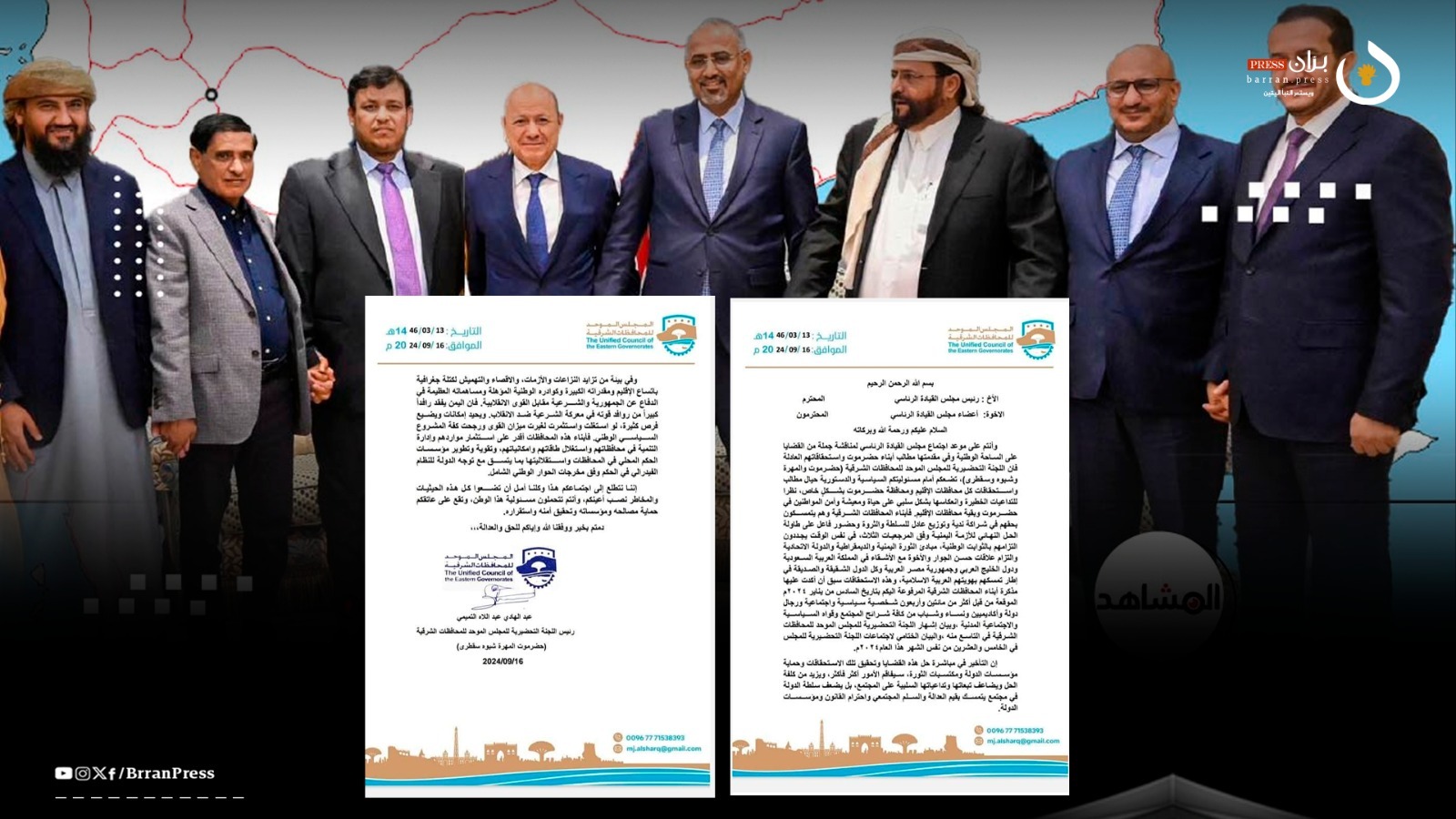


Barran Press
The Unified Council of Eastern Provinces (Hadhramaut, Mahra, Shabwa, and Socotra), on Monday, issued a stern warning to the Yemeni Presidential Leadership Council, urging immediate action to address the demands and rights of the people of Hadhramaut, particularly the governorate of Hadhramaut.
The warning came in a memorandum signed by Abdulhadi Al-Tamimi, head of the Preparatory Committee for the Unified Council of Eastern Provinces, and addressed to the Presidential Leadership Council and its members. A copy of the memorandum was obtained by "Barran Press."
The memorandum, issued ahead of the upcoming meeting of the Presidential Leadership Council, urged the council to expedite the fulfillment of the demands of the people of Hadhramaut, including "equal partnership and fair distribution of power and wealth," as well as "active participation in the final solution to the Yemeni crisis based on the three references."
The memorandum held the Presidential Leadership Council "politically and constitutionally responsible" for addressing these demands, warning of "serious" consequences and "negative" repercussions on the lives, livelihoods, and security of citizens in Hadhramaut and other governorates in the region.
The Unified Council reiterated its commitment to national principles, the principles of the Yemeni revolution, democracy, a federal state, and maintaining good neighborly relations and brotherhood with Saudi Arabia, Gulf Arab countries, Egypt, and all brotherly and friendly countries within the framework of their adherence to their Arab and Islamic identity.
The memorandum highlighted that these demands were previously emphasized in a memorandum submitted to the Presidential Leadership Council on January 6, 2024, by the people of the Eastern Provinces.
The council reiterated its warning that "delaying the resolution of these issues, fulfilling these rights, protecting state institutions, and safeguarding the gains of the revolution will further exacerbate matters, increase the cost of a solution, and multiply its negative consequences and repercussions on society, weakening the authority of the state in a society that adheres to the values of justice, social peace, respect for the law, and state institutions."
The memorandum highlighted the "ongoing exclusion and marginalization of the people of the Eastern Provinces, despite their national cadres and their significant contributions to defending the republic and legitimacy." It stated that Yemen is losing "a major source of its strength in the battle for legitimacy against the coup," adding that "if this resource were utilized and invested, it would shift the balance of power and tip the scales in favor of the national political project."
The council emphasized the ability of the people of the Eastern Provinces to "invest their resources, manage development in their governorates, utilize their energies and capabilities, strengthen and develop local governance institutions in the governorates, and ensure their independence in line with the state's direction towards a federal system of governance based on the outcomes of the comprehensive national dialogue."
In conclusion, the Eastern Provinces Council stated, "We look forward to your meeting with the hope that you will take all these considerations and risks into account, as you bear the responsibility for this nation. It is your duty to protect its interests and institutions, and ensure its security and stability."
On January 9, 2024, the Preparatory Committee for the establishment of the Unified Council of Eastern Provinces in Yemen was announced in Seiyun, Hadhramaut, "to contribute to achieving the just aspirations and goals of its people." This came days after a statement issued by over 200 figures calling for equal representation in any political settlement.
Hadhramaut has witnessed widespread tensions and protests. "Barran Press" conducted an investigative report on the matter, obtaining confirmed information that the recent tensions in Hadhramaut are the result of conflicts of interest and influence between the local authority, represented by Governor Mabkhout bin Madi, and the head of the Hadhramaut Conference and the tribal alliance, Amro bin Habrish.
Recently, the President of the Presidential Leadership Council, Rashad Al-Alimi, directed the formation of a presidential committee to consider the demands of the people of Hadhramaut and submit proposals for their resolution.